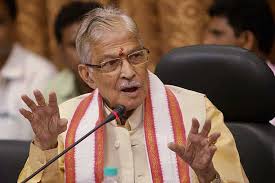Lucknow, Apr 14: In what could ruffle feathers within the Bharatiya Janata Party, senior leader Murli Manohar Joshi on Sunday said there was no “Modi wave” in the country and dismissed the applicability of the “Gujarat model of development' in other States.

“Mr. Modi gets the support from different parts of the country, from different sections of the society and from all leaders of the BJP,” the senior leader and BJP's Kanpur candidate said.
Rebuffing the Gujarat model of development, Dr. Joshi said he did not favour a “one State or a straitjacket model” of development. He said the development model pursued by the BJP-led NDA, if it came to power, would be a “development model of the country as presented by the BJP for the nation as a whole.”
“In a country like India, what model is true for Jammu and Kashmir or Arunachal Pradesh will not be true for Kerala,” he said adding that the good points from each State would be incorporated.
Commenting on the expulsion of senior leader Jaswant Singh, Dr. Joshi said the decision to deny a ticket to Mr. Singh was not a collective one and his expulsion could have been avoided, adding that the decision was taken by party president Rajnath Singh and Rajasthan Chief Minister Vasundhara Raje.





Comments
hello there and thank you for your info – I have certainly picked up anything new from right here.
I did however expertise some technical points using this website, as I experienced to reload the wesite a lot of
times previous to I could get it to load correctly. I had been wondering if
your web hosting is OK?Not that I'm complaining, but slow loading instances times will sometimes
affect your poacement in google and can damage
your high-quality score if advertising and markoeting with Adwords.
Well I am adding this RSS to my e-mail and can look out for much more of your
respective interesting content. Make sure you update this again soon.
Heree is my web-site :: Vape: http://demosite.center/punbb/profile.php?id=651
Hi there to every body, it's myy fist visit of this web site; this blog contains remarkable
and truly fine daqta for visitors.
My webpage :: visit this page: http://www.mochizuki.com/cgi/bbs/g_book.cgi/RK=0/g_book.cgi)
Everyone loves what you guys are upp too. This sort of clever work
and exposure! Keep up the exccellent works guys I've added you guuys to
our blogroll.
Feel free to visit my homepage: travel: http://www.jetlac.de/mgb/index.php
Apprfeciate thhe recommendation. Let me try it out.
Also visit my blog post: saba ace diet pills reviews: http://uoa.pp.ua/wiki/profile_kathrinh80
I am not suree where you are getting your information, but
great topic. I needs to spend some time learning much more or understanding more.
Thanks for wonderful information I was looking for
this information for my mission.
my blog post: Electronic
Cigarette: http://uoa.pp.ua/wiki/how_to_get_psyched_with_fi_st-time_vaping
Add new comment